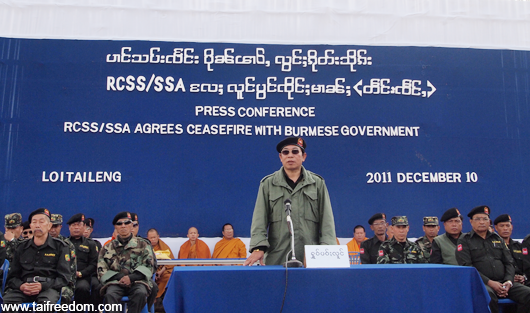According to the official statement issued by the Shan State Army (SSA) ‘South’ on Saturday, 10 December, what was achieved between itself and Naypyitaw on 2 December was only a ceasefire in principle and further details still need to be discussed to ensure that further hostilities do not take place.
 An officer from its 727th Brigade that is active in Mongton township, opposite Chiangmai, agreed. “We are not going to stage ambushes and snipings on the main thoroughfares from now on,” he said, asking his identity be withheld. “But we have yet to receive orders what to do with the Burma Army units patrolling the countryside.”
An officer from its 727th Brigade that is active in Mongton township, opposite Chiangmai, agreed. “We are not going to stage ambushes and snipings on the main thoroughfares from now on,” he said, asking his identity be withheld. “But we have yet to receive orders what to do with the Burma Army units patrolling the countryside.”
The Restoration Council of Shan State (RCSS), the political wing of the SSA, also held a public meeting on the same day to assure the populace it would not tread the same path that had divided and weakened groups that had previously concluded ceasefire pacts with the present regime’s predecessor.
U Aung Min, President Thein Sein’s special representative, had told Lt-Gen Yawdserk, the SSA chief, during their first meeting on the Thai-Burmese border on 19 November that the ceasefire agreement with him would be followed by development and a conference in the style of 1947 Panglong.
“If the actions of President U Thein Sein government do not correspond to the announcement of peace building made and there are still violations of human rights and the rights of ethnic people, RCSS/SSA is always ready to go to war by taking up arms to protect ourselves, our people and our country,” declared its statement.
Meanwhile, the 2 December ceasefire agreement and the resulting improvement in relationship between the SSA South and Naypyitaw seem to be creating an atmosphere of distrust and increased tension between its sister organization, the SSA ‘North’ and the Burma Army. “Wanhai (SSA North HQ) is expecting increased military pressure against it, now that the Burma Army has concluded a truce with the South,” said a local.
Another ally PaO National Liberation Organization (PNLO) with which the SSA South shares bases along the Thai-Burmese border suspects Loi Taileng (SSA South HQ) had decided to accept the ceasefire offer from Naypyitaw because of growing acceptance by the West of the Thein Sein government. “I think the SSA is worried, with the seemingly greater legitimacy of the new government, it is in danger of being listed as a terrorist organization,” said Khun Thurein, chief of the group’s armed wing.
Both the SSA North and PNLO are former ceasefire groups. Both are also members of the United Nationalities Federal Council (UNFC) that has insisted that negotiations are conducted not separately but with the alliance.


